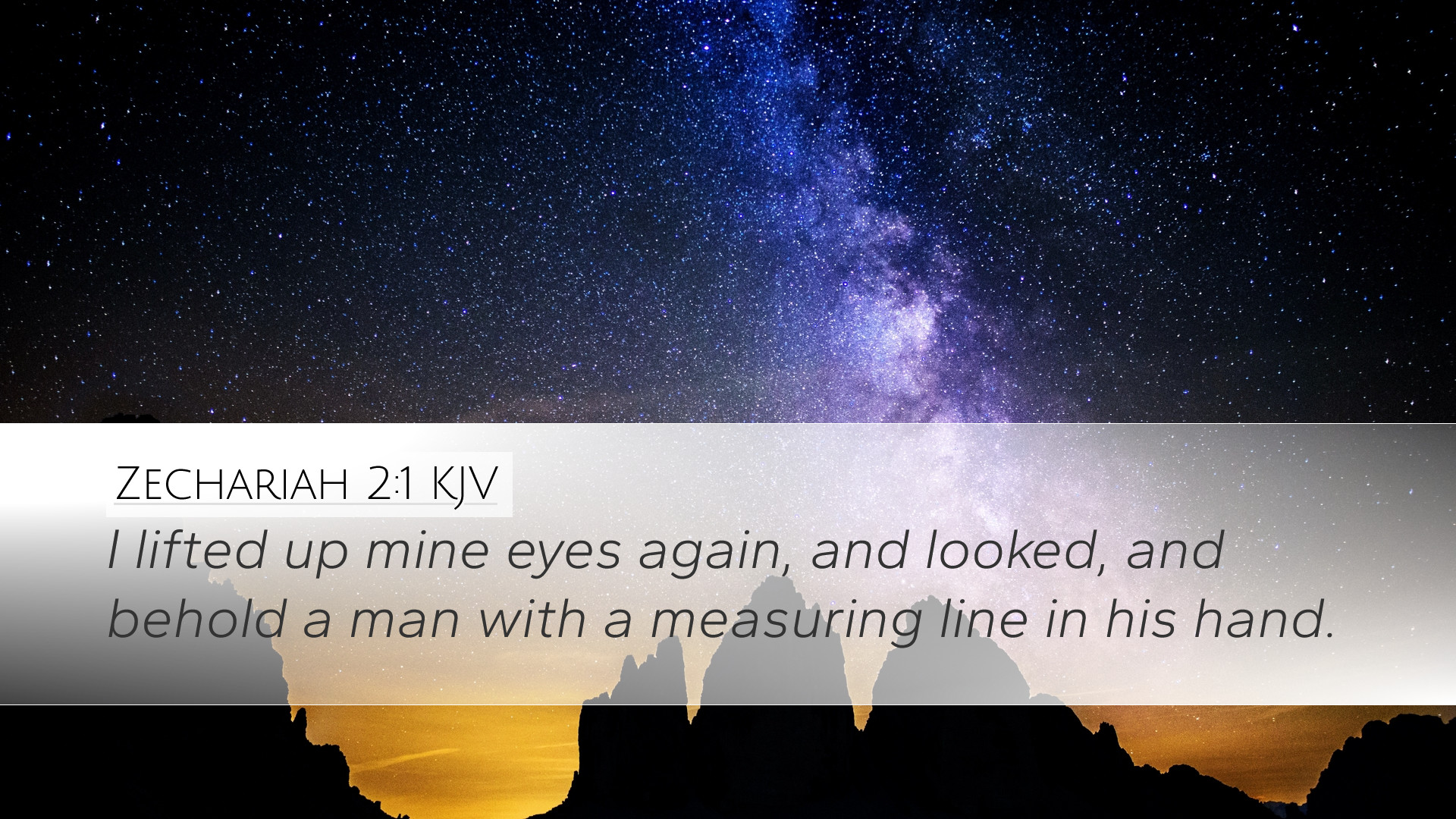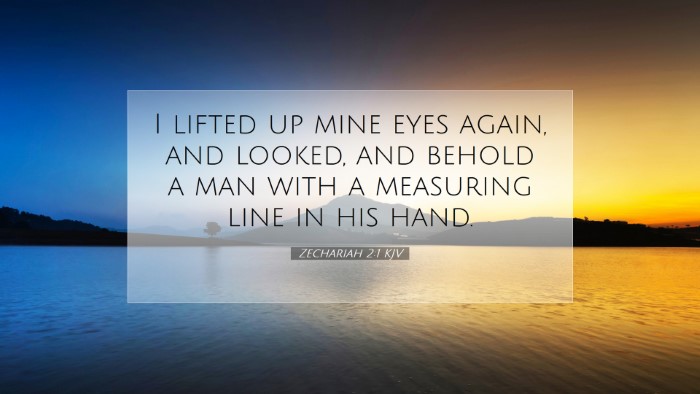Old Testament
Genesis Exodus Leviticus Numbers Deuteronomy Joshua Judges Ruth 1 Samuel 2 Samuel 1 Kings 2 Kings 1 Chronicles 2 Chronicles Ezra Nehemiah Esther Job Psalms Proverbs Ecclesiastes Song of Solomon Isaiah Jeremiah Lamentations Ezekiel Daniel Hosea Joel Amos Obadiah Jonah Micah Nahum Habakkuk Zephaniah Haggai Zechariah MalachiZechariah 2:1
Zechariah 2:1 KJV
I lifted up mine eyes again, and looked, and behold a man with a measuring line in his hand.
Zechariah 2:1 Bible Commentary
Commentary on Zechariah 2:1
Zechariah 2:1 states:
"And I lifted up mine eyes, and saw, and behold a man with a measuring line in his hand." (KJV)
Introduction
The verse introduces a significant prophetic vision where the prophet Zechariah is shown a man with a measuring line. This imagery is rich in meaning and invokes themes of divine measurement, restoration, and future hope. The commentaries by Matthew Henry, Albert Barnes, and Adam Clarke provide profound insights into this passage.
Overall Context
The book of Zechariah is set during the post-exilic period, where God is calling His people back to Himself after the Babylonian captivity. The prophecies emphasize restoration, both physical and spiritual, of Jerusalem and the temple. Zechariah’s visions symbolize God's intentions for His people and the importance of their obedience.
Detailed Commentary on Zechariah 2:1
Vision of Measurement
In this verse, Zechariah sees a man with a measuring line, suggesting the act of measuring is significant in the context of God’s covenant with His people. The idea of measurement is frequently associated with planning and definition, reflecting God's sovereign authority over His people.
Insights from Matthew Henry
Matthew Henry emphasizes that the measuring line represents God's assurance of Jerusalem's restoration. He interprets that the man measuring signifies a divine purpose to establish boundaries and signifies God's care in rebuilding His city.
Henry notes that measuring lines represent not only the physical dimensions of the city but also the spiritual condition of the people. The call to measure is a reminder to the Israelites of their identity and God's commitment to them.
Insights from Albert Barnes
Albert Barnes expands on the imagery of the measuring line, indicating it signifies a promise of expansion and protection. He suggests that the act of measuring indicates preparing for rebuilding and signifies God's intervention to restore His people to their rightful place.
Barnes also comments on the fact that the vision reflects a time when God would reclaim Jerusalem from its devastated state and bless it with prosperity and peace, signifying a time when the nations would recognize the greatness of the Lord.
Insights from Adam Clarke
Adam Clarke connects this vision with the broader themes of divine judgment and restoration. He asserts that the man with the measuring line serves as a symbol of hope for the people of Israel, ensuring them that God is actively engaged in their affairs. Clarke posits that this measuring serves the dual purpose of being a call to repentance and a declaration of impending blessings.
Clarke also highlights the anticipation of the new Jerusalem, drawing connections between this measurement and the future New Jerusalem described in the Book of Revelation. This future city is depicted with precise measurements, showing God's eternal plan.
God's Promises and Future Restoration
This verse indicates that God does not leave His people to despair but actively measures and plans their restoration. The emphasis on measurement suggests that God has a precise and deliberate plan for Jerusalem. This ties into the larger narrative of the return of the exiles and the future aims God has for His people.
- Spiritual Restoration: The act of measurement reflects God’s work in spiritually rebuilding His people, calling them back to faithfulness.
- Physical Restoration: The city is not only being marked for its physical structure but also for its societal and communal life, aiming for a place of sanctity and worship.
- Divine Protection: By measuring the city, God indicates His intention to protect and defend Jerusalem from adversaries.
Conclusion
In Zechariah 2:1, the vision of a man with a measuring line captures a moment of divine promise—a reminder to the people of Israel that restoration is imminent. Through the insights of notable commentators like Matthew Henry, Albert Barnes, and Adam Clarke, we see that this verse serves to reassure God’s people of His ongoing love, faithfulness, and their impending revival.
The themes of measurement, restoration, and protection continue to speak to contemporary believers, affirming that God carefully measures our lives, our faith, and our future, working in ways that may not always be visible to us yet are perfectly orchestrated in His divine plan.


